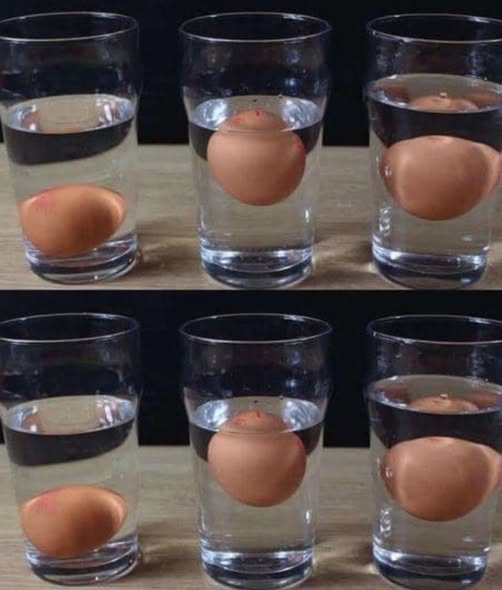🥚 Okay Eggs – How to Know If That Forgotten Egg in the Back of Your Fridge Is Still Good (Spoiler: The Float Test Works!) 🧪💧
Let’s be real:
Eggs are the ultimate kitchen MVP.
They’re always there.
Quietly chilling in their carton.
Ready to become breakfast, dinner, or that last-minute cake you promised to bring to the potluck.
But then… you open the fridge.
You pick up an egg.
It feels cold. It looks fine.
But your brain whispers:
“Is this still good… or am I courting salmonella?”
Don’t crack it open just yet.
There’s a super simple, zero-mess way to test if your egg is fresh — no smell, no guesswork.
It’s called The Float Test — and it’s science you can do in your sink. 💡
🥚 The Float Test: Weird? Yes. Accurate? Absolutely.
Here’s how it works:
1️⃣ Fill a Bowl with Cold Water
Use a deep bowl.
Add enough water to fully submerge the egg.
2️⃣ Gently Drop the Egg In
Place the egg in the water blunt-end first (to avoid cracking).
3️⃣ Watch What Happens:
3️⃣
Lies flat on the bottom
Fresh!
Less than a week old — perfect for poaching or soufflés
✅
Stands upright on the bottom
Still good
, but older (1–3 weeks). Great for scrambled eggs, baking, or hard-boiling
❌
Floats to the top
Toss it.
Too much air has built up — it’s past its prime and could be spoiled
🔬 Why the Float Test Works (The Science Bit)
Inside every egg is a small air pocket between the two membranes at the blunt end.
As an egg ages:
Moisture evaporates through tiny pores in the shell
The air pocket gets bigger
This makes the egg more buoyant
So when it floats?
That air cell has grown so large, it lifts the whole egg — like a tiny life raft made of bad decisions.
🪦 Floating doesn’t always mean it’s rotten…
But it means it’s old, dried out, and best avoided.
🧴 Other Ways to Check Egg Freshness
If you’re already cooking, here are two more methods:
👀 Crack It Open
Fresh egg: Yolk stands high, firm; white is thick and clings close
Older egg: Yolk flattens easily; white spreads out thin and watery
Spoiled egg: Smells foul, moldy, or sulfuric — toss immediately
🔦 The Flashlight Test (Candling)
Shine a bright flashlight through the egg in a dark room
Fresh eggs look dense; older ones show a larger air pocket and possible movement inside
(Used by farmers and hatcheries — fun for egg geeks!)
🗓️ How Long Do Eggs Last?
In the fridge
4–5 weeks from purchase
(even past the “sell-by” date!)
At room temperature
1–2 weeks max
(not recommended in most countries)
Hard-boiled
1 week in the shell
(peeled ones last 2 days)
✅ Pro Tip: Store eggs in the original carton — it protects them and keeps them from absorbing fridge odors.
❌ When to Definitely Toss an Egg
Even if it sinks, throw it out if:
It smells bad when cracked
The shell is cracked or slimy
There’s pink, green, or iridescent discoloration (bacterial growth)
You’re unsure — trust your gut (literally)
❤️ Final Thought: Don’t Fear the Fridge Egg
You don’t need a PhD or a magic wand to know if your egg is good.
Just a bowl of water and a moment of curiosity.
Because sometimes, the best food safety tricks aren’t complicated — they’re old, weird, and shockingly effective.
So next time you’re staring down a mystery egg…
Don’t panic.
Drop it in water.
And let physics decide.
Because great meals start with fresh ingredients — and p
Watch What Happens
✅eace of mind. 💛
Advertisement
